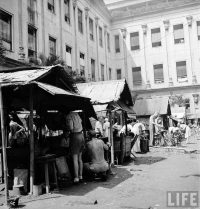The army nurses had left for Corregidor and Bataan, and only a few of the medical officers of the administrative staff were left. The civilian nurses, like myself, stayed on to complete the evacuation and packing of equipment.
One of the city’s former American civilian doctors, now in the army reserve, came to my ward to bid me goodbye.
I had met him three years before on my first private duty case in Manila, and what a time I had had with a rambunctious patient who insisted on having six doctors, each of them countermanding the other’s order. When I confided my troubles to the doctor who stood before me, he had said, “Just ignore the other orders. I’m the one in charge!”
He was still giving orders, for when he saw the civilian Nazi doctor in the ward, he took a menacing step toward him and in a voice filled with hate, demanded, “What are you doing here, you S..O.B…of a Nazi?”
The Nazi ran like a whipped dog, and he was out of the door before anyone could say another word. The next time I saw him, a day later, he was standing at the paymaster’s window in front of me.
I wanted to make a scene, to shout and tell the paymaster not to give him his money. Instead, I did nothing. What was the use? The U. S. Army had left, and soon the Japs would occupy the city.
Before Jinny left to join her husband in Bataan, she had asked me to look after a friend and co-worker of her husband. Both men had been employed by the same Stateside Oil Company: I readily agreed and now my family had increased again.
Henry came today. He was a bachelor, shy and quiet, but his friendly manner and homespun sallies helped to ease many tense moments. It was difficult to believe that this quiet man had set fire to huge installations of gas and oil in carrying out the U. S. Army’s scorched-earth policy. He had done a good job, and it was doubtful that the enemy found any gas when they entered the city.
